实用文体翻译教程(英汉双向)第九章 法律文体的翻译
- 格式:ppt
- 大小:2.84 MB
- 文档页数:50
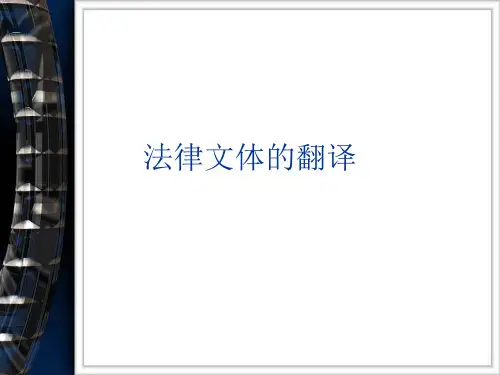
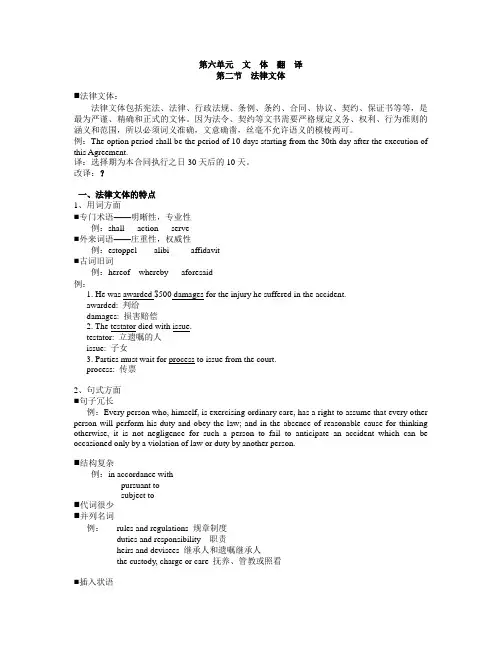
第六单元文体翻译第二节法律文体⏹法律文体:法律文体包括宪法、法律、行政法规、条例、条约、合同、协议、契约、保证书等等,是最为严谨、精确和正式的文体。
因为法令、契约等文书需要严格规定义务、权利、行为准则的涵义和范围,所以必须词义准确,文意确凿,丝毫不允许语义的模棱两可。
例:The option period shall be the period of 10 days starting from the 30th day after the execution of this Agreement.译:选择期为本合同执行之日30天后的10天。
改译:?一、法律文体的特点1、用词方面⏹专门术语——明晰性,专业性例:shall action serve⏹外来词语——庄重性,权威性例:estoppel alibi affidavit⏹古词旧词例:hereof whereby aforesaid例:1. He was awarded $500 damages for the injury he suffered in the accident.awarded: 判给damages: 损害赔偿2. The testator died with issue.testator: 立遗嘱的人issue: 子女3. Parties must wait for process to issue from the court.process: 传票2、句式方面⏹句子冗长例:Every person who, himself, is exercising ordinary care, has a right to assume that every other person will perform his duty and obey the law; and in the absence of reasonable cause for thinking otherwise, it is not negligence for such a person to fail to anticipate an accident which can be occasioned only by a violation of law or duty by another person.⏹结构复杂例:in accordance withpursuant tosubject to⏹代词很少⏹并列名词例:rules and regulations 规章制度duties and responsibility 职责heirs and devisees 继承人和遗嘱继承人the custody, charge or care 抚养、管教或照看⏹插入状语例:If I shall during the hearing: (a) make default …; or (b) do suffer or omit any act …又如:The Publisher may, if they think fit, decline to publish the Work.⏹被动语态3、格式方面⏹指称间接性⏹专有名词⏹标点符号少4、风格方面⏹严谨缜密⏹正式保守⏹客观冷峻⏹练习:1. The master or the any other person signing this agreement on behalf of the property to be salved is not authorized to make or give and the contractor shall not demand or take, any payment, draft or order for or on account of the remuneration.译文:为待救财产签订本协议,船长或其他人无权签发或给予任何现金、汇票或提款单作为酬金,承包人不得要求或接受上述酬金。

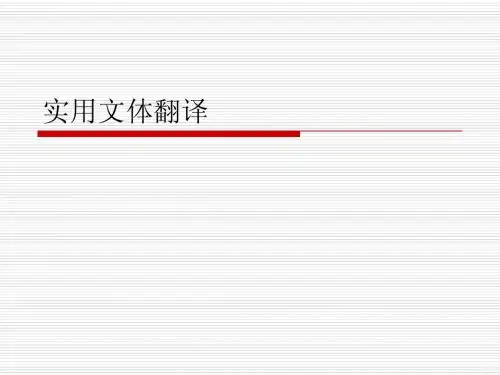
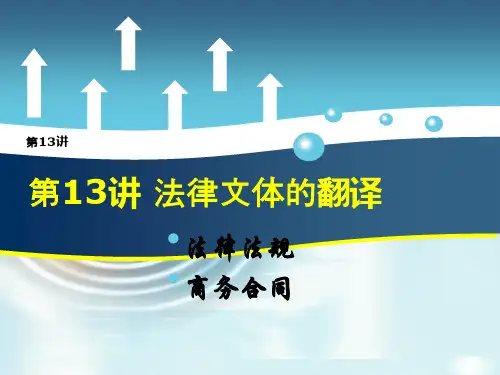
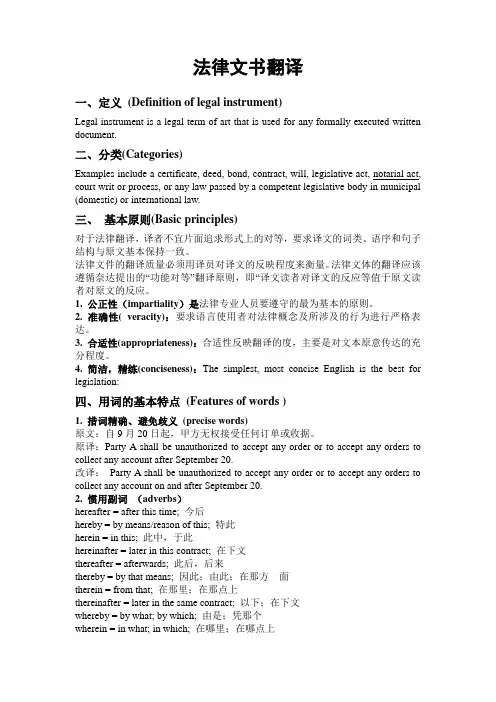
法律文书翻译一、定义(Definition of legal instrument)Legal instrument is a legal term of art that is used for any formally executed written document.二、分类(Categories)Examples include a certificate, deed, bond, contract, will, legislative act, notarial act, court writ or process, or any law passed by a competent legislative body in municipal (domestic) or international law.三、基本原则(Basic principles)对于法律翻译,译者不宜片面追求形式上的对等,要求译文的词类、语序和句子结构与原文基本保持一致。
法律文件的翻译质量必须用译员对译文的反映程度来衡量。
法律文体的翻译应该遵循奈达提出的“功能对等”翻译原则,即“译文读者对译文的反应等值于原文读者对原文的反应。
1. 公正性(impartiality)是法律专业人员要遵守的最为基本的原则。
2. 准确性( veracity):要求语言使用者对法律概念及所涉及的行为进行严格表达。
3. 合适性(appropriateness):合适性反映翻译的度,主要是对文本原意传达的充分程度。
4. 简洁,精练(conciseness):The simplest, most concise English is the best for legislation:四、用词的基本特点(Features of words )1. 措词精确、避免歧义(precise words)原文:自9月20日起,甲方无权接受任何订单或收据。




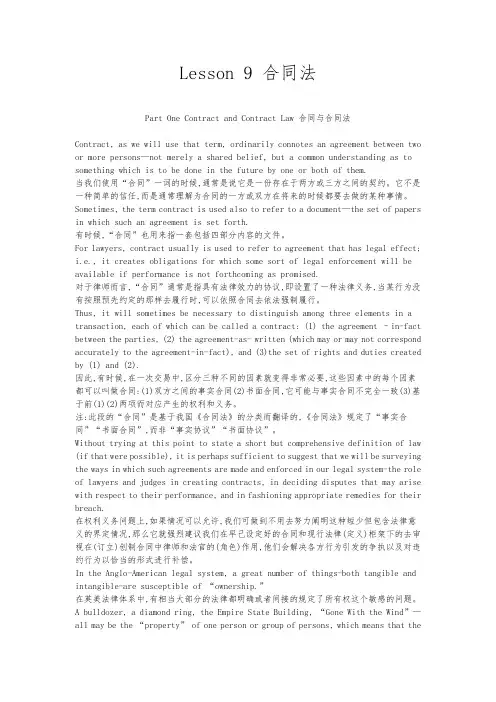
Lesson 9 合同法Part One Contract and Contract Law 合同与合同法Contract, as we will use that term, ordinarily connotes an agreement between two or more persons—not merely a shared belief, but a common understanding as to something which is to be done in the future by one or both of them.当我们使用“合同”一词的时候,通常是说它是一份存在于两方或三方之间的契约。
它不是一种简单的信任,而是通常理解为合同的一方或双方在将来的时候都要去做的某种事情。
Sometimes, the term contract is used also to refer to a document—the set of papers in which such an agreement is set forth.有时候,“合同”也用来指一套包括四部分内容的文件。
For lawyers, contract usually is used to refer to agreement that has legal effect;i.e., it creates obligations for which some sort of legal enforcement will be available if performance is not forthcoming as promised.对于律师而言,“合同”通常是指具有法律效力的协议,即设置了一种法律义务,当某行为没有按照预先约定的那样去履行时,可以依照合同去依法强制履行。
Thus, it will sometimes be necessary to distinguish among three elements in a transaction, each of which can be called a contract: (1) the agreement –in-fact between the parties, (2) the agreement-as- written (which may or may not correspond accurately to the agreement-in-fact), and (3)the set of rights and duties created by (1) and (2).因此,有时候,在一次交易中,区分三种不同的因素就变得非常必要,这些因素中的每个因素都可以叫做合同:(1)双方之间的事实合同(2)书面合同,它可能与事实合同不完全一致(3)基于前(1)(2)两项而对应产生的权利和义务。
法律文书翻译一、定义(Definition of legal instrument)Legal instrument is a legal term of art that is used for any formally executed written document.二、分类(Categories)Examples include a certificate, deed, bond, contract, will, legislative act, notarial act, court writ or process, or any law passed by a competent legislative body in municipal (domestic) or international law.三、基本原则(Basic principles)对于法律翻译,译者不宜片面追求形式上的对等,要求译文的词类、语序和句子结构与原文基本保持一致。
法律文件的翻译质量必须用译员对译文的反映程度来衡量。
法律文体的翻译应该遵循奈达提出的“功能对等”翻译原则,即“译文读者对译文的反应等值于原文读者对原文的反应。
1. 公正性(impartiality)是法律专业人员要遵守的最为基本的原则。
2. 准确性( veracity):要求语言使用者对法律概念及所涉及的行为进行严格表达。
3. 合适性(appropriateness):合适性反映翻译的度,主要是对文本原意传达的充分程度。
4. 简洁,精练(conciseness):The simplest, most concise English is the best for legislation:四、用词的基本特点(Features of words )1. 措词精确、避免歧义(precise words)原文:自9月20日起,甲方无权接受任何订单或收据。